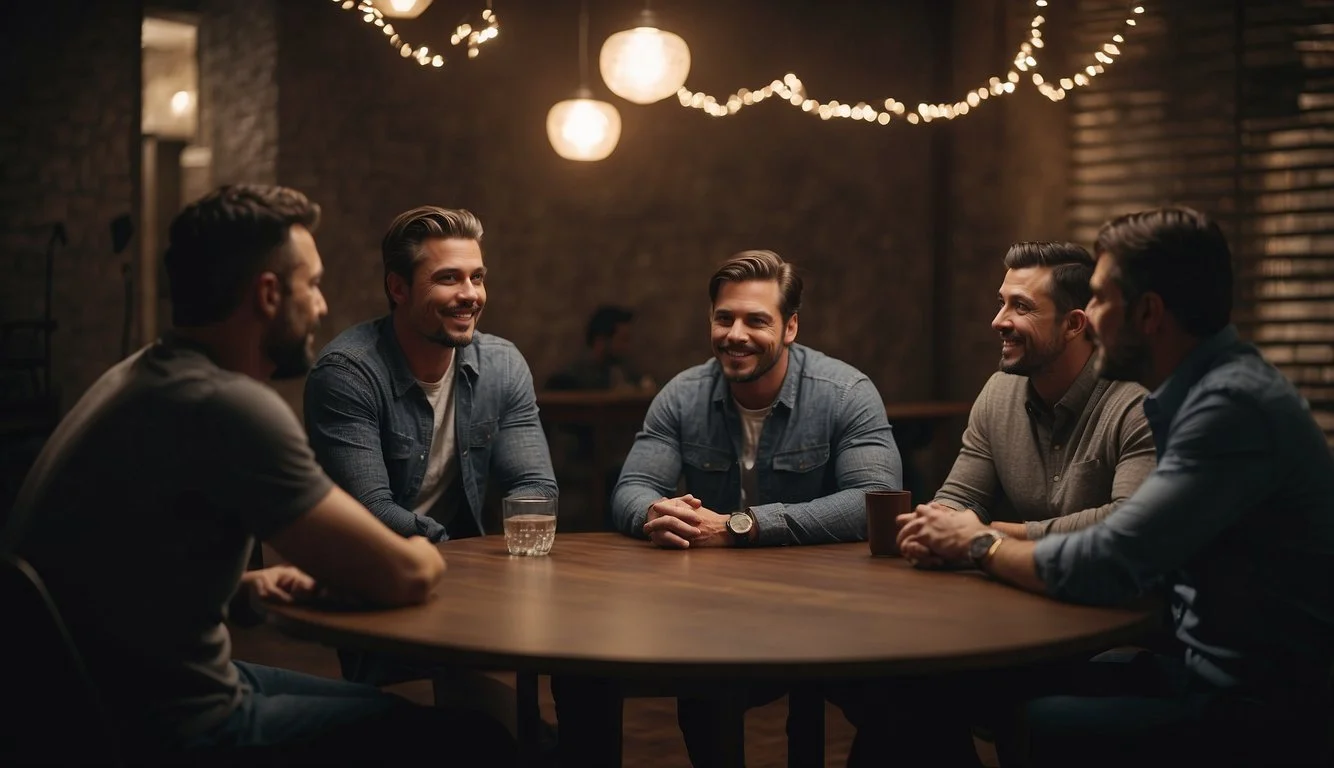Documentary Review: The Work (2017)
A Riveting Inside Look at Group Therapy
Prison documentaries often highlight harsh realities, but "The Work" (2017) breaks this mold by focusing on rehabilitation and emotional healing. Set within the walls of Folsom State Prison, the film captures an intense four-day group therapy session where inmates and civilians confront their deepest traumas together.
The co-directors, Jairus McLeary and Gethin Aldous, skillfully capture these raw and powerful moments, making the documentary a unique exploration of vulnerability and transformation. McLeary and Aldous present a riveting view into how structured emotional support can break down barriers, including racial and societal divisions, within a notoriously tough environment.
By providing an unflinching look at the human capacity for change, "The Work" leaves a lasting impression on its audience, inviting viewers to reconsider their perceptions of prisoners and the correctional system. This documentary is not just about the confines of incarceration; it's a testament to the resilience and interconnectedness of the human spirit.
Overview of 'The Work'
"The Work" (2017) is a documentary that explores the intense group therapy sessions conducted within Folsom State Prison, offering a raw look into the transformative power of emotional expression and rehabilitation. Directed by Jairus McLeary and Gethin Aldous, the film brings viewers into a space where boundaries between inmates and outsiders blur.
Film Synopsis
"The Work" documents an intensive four-day group therapy session at Folsom State Prison. It focuses on both inmates and outsiders who participate to confront personal traumas. The powerful interactions facilitated by therapists guide them through emotional breakthroughs.
These sessions reveal deep-seated pain, guilt, and the potential for personal growth.
The film's raw and honest portrayal highlights the remarkable transformations that occur within just a few days of deep therapeutic engagement.
Each individual’s journey provides unique insights into the collective healing process.
Production Background
Jairus McLeary and Gethin Aldous co-directed "The Work," combining their expertise to craft a poignant narrative. The documentary was produced with the aim of providing an authentic depiction of prison rehabilitation programs.
The project involved extensive collaboration with Folsom State Prison, which allowed unprecedented access to film the therapy sessions.
The production crew faced numerous challenges, such as ensuring the confidentiality and safety of participants.
Despite these hurdles, the directors succeeded in maintaining the film's integrity and raw emotional impact, which resonates deeply with audiences.
Film Structure
"The Work" is structured to convey the progression of the four-day therapy program. The documentary begins with the participants entering the prison, setting an initial tone of apprehension and curiosity.
The film then delves into the daily therapy sessions, showcasing pivotal moments of emotional release and connection.
The structure effectively builds tension and empathy, keeping viewers engaged throughout.
By interweaving the personal stories of inmates and outsiders, the directors create a compelling narrative that underscores the shared human experience and the potential for redemption.
Critical Analysis
"The Work" provides a powerful portrayal of prison rehabilitation through group therapy, capturing the intense emotional journey of both inmates and outsiders. Its thematic depth, visual storytelling, and sound design contribute significantly to its compelling narrative.
Thematic Exploration
"The Work" thoroughly explores the theme of personal transformation within the confines of a prison setting. The film emphasizes the power of vulnerability and emotional honesty in fostering rehabilitation. By focusing on the intimate moments in the group therapy sessions, it highlights themes of masculinity, trauma, and societal reintegration. The interactions between inmates and civilian participants shed light on the universal human need for connection and healing, breaking down preconceived barriers and stereotypes.
Cinematography and Visuals
The cinematography of "The Work" stands out in its ability to capture raw, unfiltered emotions. The use of close-up shots brings viewers into the personal space of the participants, making the experiences highly immersive. The documentary leverages the stark environment of Folsom State Prison to create a visually intense backdrop. The directors, Jairus McLeary and Gethin Aldous, employ natural lighting and minimalist settings to ensure that the focus remains on the subjects’ emotional journeys rather than the physical surroundings.
Soundtrack and Audio Elements
The audio elements in "The Work" play a crucial role in enhancing the emotional depth of the film. The soundtrack, though subtle, underscores the intensity of the therapy sessions. The use of ambient sounds from the prison adds authenticity to the viewing experience. Dialogues are clear and potent, capturing the raw emotions and the vulnerability of the participants. This meticulous attention to audio detail helps to maintain the documentary’s immersive quality and supports the powerful storytelling.
Performance and Casting
At the heart of "The Work" are authentic interactions and the genuine emotional outpourings of its participants. The film's impact relies heavily on its main participants and the supporting cast, who enhance the narrative with their vulnerability and honesty.
Main Participants
The main participants are a group of inmates and civilians who engage in an intense group therapy session within the walls of Folsom State Prison. Each participant brings their real-life experiences to the table, creating a raw and emotional atmosphere. The inmates openly discuss their past traumas and personal growth, while the civilians share their struggles, bridging the gap between life inside and outside prison.
Particularly notable is the performance of James McLeary, who facilitates the sessions with a profound understanding of the human psyche. His presence is a stabilizing force, encouraging participants to confront their deepest fears and insecurities. This genuine sincerity and dedication to the process form the backbone of the documentary’s emotional depth.
Supporting Cast
Complementing the central figures are the supporting participants, including other inmates and members of the therapy circle. These individuals, while not always at the forefront, add layers of depth to the overall narrative. Their interactions and shared experiences create a more comprehensive understanding of the therapeutic process and the complexities of rehabilitation.
Each supporting member, through their candid expressions and emotional hurdles, contributes to the group dynamics. Their willingness to participate and be vulnerable in front of the camera is instrumental in showcasing the transformative power of the therapy sessions. This collective effort underscores the documentary’s message of shared humanity and healing.
Audience Reception
"The Work" (2017) has captured the attention of critics and viewers alike, receiving commendations for its raw portrayal of prison rehabilitation. This section delves into critical acclaim, viewer feedback, and its performance in the box office and distribution.
Critical Acclaim and Reviews
Critics praised "The Work" for its unflinching look at the emotional depths within Folsom State Prison's group therapy sessions. Roger Ebert highlighted the film's ability to observe rather than preach, elevating its narrative power. The Hollywood Reporter called it a remarkable piece of reportage, emphasizing its immersive nature.
Jeannette Catsoulis from The New York Times noted the film's impactful storytelling, while Slant Magazine commended its visceral approach, bringing male toxicity to light. This positive critical response underscored the documentary's success in both its subject matter and execution.
Viewer Feedback
Viewer feedback has been overwhelmingly positive, with many individuals finding the film deeply moving and powerful. Audiences were struck by the raw emotions and the surprising similarities between the inmates' issues and those faced in the broader society.
IMDb users rated the film highly, with comments often mentioning its masterful portrayal of vulnerability and transformation. The personal stories and the portrayal of genuine human connection resonated strongly, enhancing the film's impact across diverse viewerships.
Box Office and Distribution
The distribution strategy for "The Work" included both film festivals and limited theatrical release. Premiering at SXSW in March 2017, it garnered significant attention and acclaim. This festival circuit success facilitated further viewings in select theaters.
While not a major box office hit, its specialized nature found a niche audience, contributing to robust discussions and solidifying its presence in the documentary genre. The film’s availability on streaming platforms has since expanded its reach, ensuring that its message continues to find new audiences.
Cultural and Social Impact
The Work (2017) stands as a significant piece that has influenced both the documentary filmmaking industry and the public's perception of prison rehabilitation programs.
Impact on Documentary Filmmaking
The Work showcases a new approach to documentary filmmaking, emphasizing authenticity and deep emotional engagement. The film's setting inside Folsom Prison highlights the raw and unfiltered nature of its content.
This approach has inspired filmmakers to pursue stories that are both intimate and impactful. By focusing on personal transformation and human connection, The Work sets a benchmark for portraying real-life experiences.
Moreover, its success has encouraged documentarians to pursue topics that challenge social norms and provoke critical thinking.
Discussion on Themes
The central themes of The Work include redemption, vulnerability, and human connection. By focusing on these elements, the documentary underscores the power of personal transformation and the potential for healing within prison walls.
The film challenges the stigma associated with incarceration and opens up a dialogue about the capacity for change, not only among inmates but within the broader society.
These themes resonate deeply with audiences, leading to a nuanced understanding of the human condition and fostering empathy across different social strata.
Personal Reflection
The Work (2017) is a powerful documentary illustrating the profound impact of group therapy within the confines of Folsom State Prison.
The film's premise may initially appear straightforward, but the emotional intensity it captures offers a unique viewing experience. Here, the inmates confront deep-seated issues of anger, trauma, and masculinity.
Through intimate, raw moments, viewers gain insight into the prisoners' personal struggles as they navigate their path to healing. The film challenges preconceived notions about incarceration, providing a compelling narrative about human connection and transformation.
The diverse backgrounds of the participants within the group therapy sessions illuminate the shared human experience, regardless of one's past. Racial segregation within the prison walls is noticeably absent during these sessions, replaced by a collective aim for emotional growth.
The Work stands out not merely as a documentary but as a testament to the potential for redemption and the human capacity for change.
As the inmates and outside participants engage in intense dialogues, the film demonstrates how vulnerability and honesty can bridge even the widest divides. These authentic interactions evoke a sense of hope.
The minimalist filming approach cultivates an intimate viewer experience, emphasizing the authenticity of each emotional revelation. Each person’s story unfolds without unnecessary embellishments, spotlighting the raw, unfiltered human experience.
The documentary’s unflinching look at male psychology and rehabilitation resonates deeply, prompting reflection on broader societal issues. The power of communal healing and personal accountability is evident throughout, leaving a lasting impact on the audience.
Conclusion and Recommendations
"The Work" (2017) is an impactful documentary that highlights the transformative power of group therapy in a prison setting. Directed by Jairus McLeary and Gethin Aldous, the film captures the raw and emotional journey of inmates at Folsom State Prison as they engage in an intensive therapeutic process.
Strengths:
Authentic Representation: The film portrays the inmates' experiences with sincerity and depth.
Emotional Impact: The emotional release and personal growth of the participants are palpable and moving.
Social Relevance: The documentary addresses important social issues surrounding incarceration and rehabilitation.
Areas for Improvement:
Pacing: Some viewers might find the pacing slow in certain parts.
Focused Audience: The subject matter may not appeal to all audiences, particularly those uncomfortable with intense emotional content.
Recommendations:
For Educators and Therapists: This film is a valuable resource for understanding the potential of group therapy in rehabilitation.
For Documentary Enthusiasts: Those interested in real-life stories and social issues will find "The Work" compelling and thought-provoking.
For General Viewers: Be prepared for an emotionally intense and sometimes challenging viewing experience.
"The Work" serves as a testament to the power of vulnerability and collective healing. It is a significant addition to the genre of documentary filmmaking, offering insights and fostering empathy for those often unseen and unheard.





